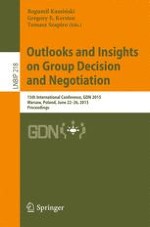2015 | OriginalPaper | Buchkapitel
Vote Swapping in Representative Democracy
verfasst von : Hayrullah Dindar, Gilbert Laffond, Jean Lainé
Erschienen in: Outlooks and Insights on Group Decision and Negotiation
Aktivieren Sie unsere intelligente Suche, um passende Fachinhalte oder Patente zu finden.
Wählen Sie Textabschnitte aus um mit Künstlicher Intelligenz passenden Patente zu finden. powered by
Markieren Sie Textabschnitte, um KI-gestützt weitere passende Inhalte zu finden. powered by
